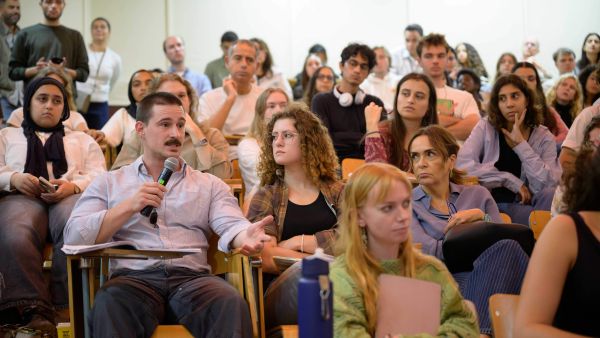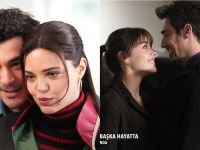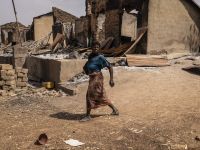AUC Hosts Renowned Historian Rashid Khalidi to Speak About the 100-year War on Palestine

The American University in Cairo (AUC) recently hosted renowned historian Rashid Khalidi in a talk titled “The Hundred Years’ War on Palestine. A Conversation with Rashid Khalidi.” Khalidi is the Edward Said Professor Emeritus of Modern Arab Studies at Columbia University's Department of History. The talk, moderated by Rabab El Mahdi '96, '98, associate professor of political science at AUC, offered students an opportunity to engage directly with one of the most influential contemporary voices on Middle East history and politics.
Khalidi’s talk focused on his acclaimed book, The Hundred Years’ War on Palestine: A History of Settler Colonialism and Resistance, which presents a detailed, century-long historical analysis, spanning from 1917 to 2017, arguing that the struggle over Palestine is best understood as a “War on Palestine,” a continuous, century-long campaign of settler colonialism and indigenous resistance.
Khalidi opened the talk by sharing the personal motivation behind the rigorously researched work, noting he wrote the book primarily for a Western audience to counter decades of “disinformation, lies and myths” that have distorted the history of Palestine. “I wrote the book to respond to the distortions surrounding Palestine and to offer a narrative grounded in lived history, my family’s experience and the voices of ordinary people.”
He emphasized that the entire argument of his book is encapsulated in its full title: The Hundred Years’ War on Palestine: A History of Settler Colonialism and Resistance. “Every word in that title is meant to convey a specific message... I wanted to establish clearly and emphatically that this is a series of events that started with the advent of British colonialism in Palestine.”
Khalidi discussed how the dynamics he traces over a century—colonial intervention, geopolitical power imbalances and the struggle for self-determination—continue to shape present-day realities. He emphasized that the conflict over Palestine is fundamentally a modern political struggle driven by specific colonial and political forces, rather than an ancient religious or ethnic feud.
The event, held in a fully packed hall, drew a wide array of attendees, including local and international students from various academic disciplines, faculty, and community members, underscoring the keen interest in the historical narrative surrounding Palestine. They asked about the impact of shifting U.S. public opinion, the implications of recent European recognition of the State of Palestine, and the reliability of social media as a primary source for documenting the war, especially given investments in state-sponsored content creation. Others raised broader regional issues, including the fragmentation of the Arab world, external intervention in local conflicts and how global injustices—from Sudan to Syria—intersect with the Palestinian struggle.
Khalidi concluded on a note of cautious optimism, pointing to what he described as an unprecedented shift in global public opinion, particularly among young people. “What people saw in Gaza cannot be unseen,” he said. “And for the first time, because of social media and independent reporting, many are no longer reliant on mainstream narratives. Young people today have played a decisive role in challenging decades of misinformation.”
For AUC students, the event offered more than a historical analysis. It provided a space to reflect on contemporary realities, understand global interconnections and consider the responsibilities of emerging scholars, citizens and advocates.
Background Information
American University of Cairo
Founded in 1919, AUC is a leading English-language, American-accredited institution of higher education and center of intellectual, social and cultural life of the Arab world. Its community of students, parents, faculty and staff, trustees, alumni and other generous sponsors represent more than 60 countries. The University stands as a crossroads for the world’s cultures and a vibrant forum for reasoned argument, spirited debate and understanding across the diversity of languages, facilities and human experiences.






